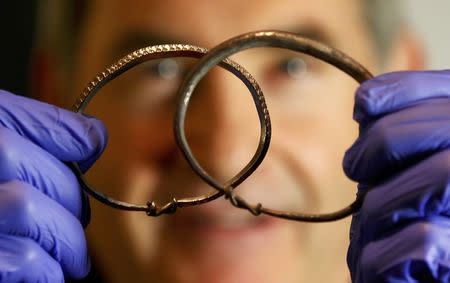Metal detectorist finds Viking treasure in Britain
LONDON (Reuters) - A hoard of Viking coins, silver and jewellery could shine new light on the history of how the Kingdom of England came to exist, after it was discovered by a British amateur metal detectorist. The 186 coins, seven pieces of jewellery and 15 silver ingots were buried around the end of the 870s AD as Anglo-Saxon kings, in what is today England, began to fight back against Viking expansion across Britain. "The hoard comes from a key moment in English history," said Gareth Williams, curator of Early Medieval Coinage at the British Museum. Detectorist James Mather found the hoard, described as "nationally significant" by archaeologists, in October in Watlington, Oxfordshire and his discovery was announced on Thursday at the British Museum in London. Vikings had been attacking Anglo-Saxon positions in today's Britain since the late 8th century but at the end of the 9th century, King Alfred of Wessex, Alfred the Great, defeated Viking forces at the battle of Edington, in southwest England. It was a turning point that eventually caused Anglo-Saxon power to be unified as the Kingdom of England in the 10th century. The find includes rare coins from Alfred's Wessex and from King Ceolwulf II's Kingdom of Mercia. It also contains Viking arm-rings and silver ingots. "This hoard has the potential to provide important new information on relations between Mercia and Wessex," Williams said. The hoard will now be assessed by an inquest at which a coroner will decide whether it can be officially regarded as treasure. If it is, Oxford's Ashmolean Museum has expressed interest in helping put it on display. The find is one of many made by members of the public every year. These finds are recorded by Britain's Portable Antiquities Scheme which can be viewed online. Over 100,000 archaeological finds were reported to the scheme in 2014 and 1,008 finds were declared as treasure. Ninety percent of this treasure was found by people with metal detectors. (Reporting by Lisa Barrington; editing by Stephen Addison)

 Yahoo News
Yahoo News 


